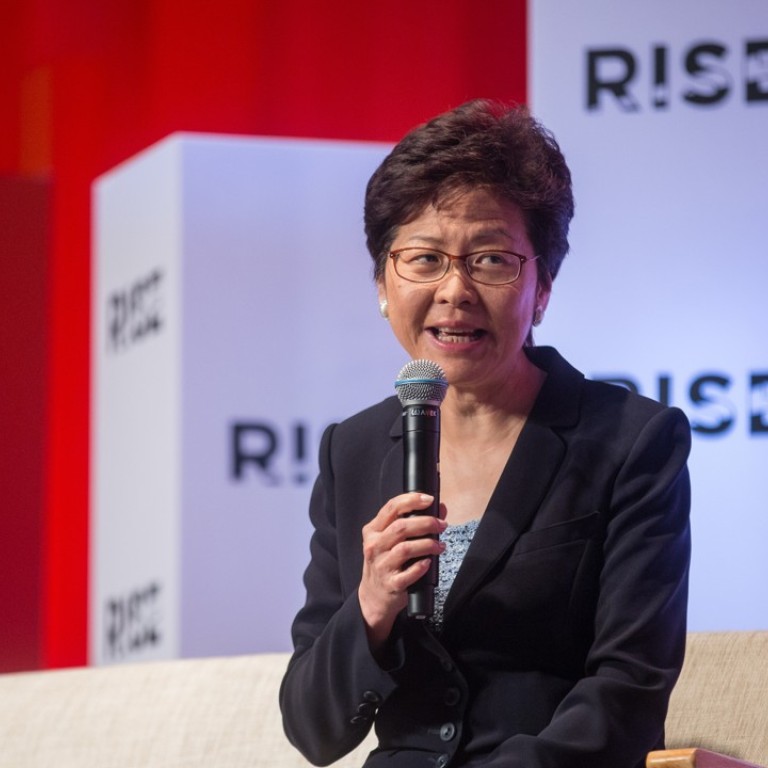
New bids to attract IT talent to Hong Kong will help, but city faces tech sector challenges, experts say
In one scheme, companies can hire up to two people with a PhD in a relevant discipline, with each receiving HK$32,000 per month for up to two years
Two schemes to help companies hire PhD holders and train staff will boost Hong Kong’s efforts to recruit and nurture technology talent, but the city still faces an uphill task in expanding innovative industries as well as workers’ skills, lawmakers and experts said.
Their remarks came as applications opened for the Postdoctoral Hub and the Reindustrialisation and Technology Training programmes on Wednesday.
Under the first scheme, selected companies either funded by the government or operating from the city’s two major innovation hubs can hire up to two people with a doctoral degree in a science, technology, engineering or maths discipline. Each will receive a monthly allowance of HK$32,000 (US$4,000) for up to 24 months.
As part of the second scheme, the government will subsidise local private companies on a 2:1 matching basis to train their staff in advanced technologies. Staff must be permanent residents in Hong Kong, and each eligible company can receive up to HK$500,000 from the programme in a year.

Fred Zhou Xiaoyu, 27, a fresh graduate with a doctoral degree in biochemistry from the University of Science and Technology, described the HK$32,000 allowance as “rather attractive”.
“Postdoctoral researchers in local universities are usually paid HK$20,000 to HK$25,000 per month,” Zhou said. “HK$32,000 should make many young researchers willing to leave campuses for companies.”
Irene Wong, co-founder and chief executive officer of start-up IxFintech, noted she had long been waiting for the allowance scheme. “We will move faster on recruiting two shortlisted candidates with doctoral degrees for the position of data scientist,” Wong said.
Immigration scheme to lure tech workers based on ‘rough estimation’
Both Wong and Langston Suen, founder of biomedical firm Opharmic Technology, said HK$32,000 was a reasonable wage for a postdoctoral talent with little or no working experience.
“For the six postdoctoral employees in our company, the best salary is around HK$70,000,” added Albert Lam, chief scientist of artificial intelligence start-up Fano Labs.
The allowance would help us reduce the employment cost
“The allowance would help us reduce the employment cost,” Lam said, though he admitted his company had been expecting it could get funding for more than two PhD holders.
The Peacock Programme launched by Shenzhen officials in 2011 to attract overseas talent offers one-off subsidies ranging from 800,000 yuan (US$116,00) to 1.5 million yuan, in addition to welfare packages covering family members, rental allowances and medical care.
But Zhou said he would like to stay in Hong Kong to finish his research in genetic science.
“The environment for scientific research and the living quality here are better,” he explained.
Lawmakers and technology experts welcomed the launch of the schemes but called for more to be done.
‘Talent list’ to lure foreign workers to Hong Kong
Francis Fong Po-kiu, honorary president of the Hong Kong Information Technology Federation, said: “Besides providing short-term allowances, the government should attract more major technology companies to set up research and development branches here by providing tax and rental incentives.”
“Only in this way could the local community of technology talent generate positive synergy and talent at different levels could contribute their potential,” Wu said.
Hong Kong IT chiefs having trouble finding talent, poll shows
Dennis Ng Wang-pun, president of the Chinese Manufacturers’ Association, said staff trained in Hong Kong to harness intelligent manufacturing systems would be poised to run factories built on the mainland or in Southeast Asia.
“In the future, more than half the manufacturers [across industries] would control their production lines with a smart system,” Ng said. “Staff with relevant training are needed as even an earphone factory run by my friend hires some 300 researchers to look for the best design.”
Technology sector lawmaker Charles Mok asked for more funding for people who wanted to continue their education to keep abreast of new trends or learn new skills for different jobs.
“Support for continuing education shouldn’t be restricted,” he said. “It should benefit as many as possible in the entire labour force.”

